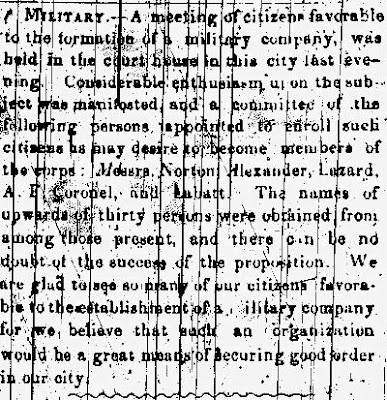As a response, citizens frequently formed militias and paramilitary organizations that were formed ostensibly to make up for the shortfall and fight crime. Many of these wound up being more like social clubs (drinking parties) than crime-fighting organizations, but occasionally there were some that served as the latter.
The best known was the Los Angeles Rangers. By mid-1853, frustration with unmitigated crime led to a community meeting. The 8 July issue of the Los Angeles Star featured an article that covered the gathering held at the court house.
It was noted that "considerable enthusiasm . . . was manifested" about forming a military company and a committee was formed to recruit members. This group featured Myron Norton, a judge and attorney, Henry N. Alexander, who had various law enforcement roles, merchant Solomon Lazard, S.K. Labatt, and Antonio Franco Coronel, the sole Latino in the effort and who was a councilman, mayor and later California state treasurer.
From those attending the gathering, some thirty expressed an interest in joining, from which the paper observed, "we are glad to see so many of our citizens favorable to the establishment of a military company" because this "would be a great means of securing good order in our city."
 |
| The 8 July 1853 issue of the Los Angeles Star covered a citizens' meeting held at the county court house for the formation of a military company, which became the Los Angeles Rangers. |
Within a short time, the formal organization of the Rangers was achieved. On 6 August, the same day that it was reported that the notorious bandido Joaquin Murieta had been captured in northern California (or so it was alleged), the Star published an article detailing the creation of the paramilitary group.
The piece started off by noting that "the people of this county have long felt the necessity of having among them an efficient milirary force, which could be brought out promptly to aid of the laws and for the protection of life and property."
However, the article continued, "we are not only exposed to regular predatory visits from indians from the neighboring mountains, who come here to feed on cattle and carry off horses" but "we have seen organized band of robbers, well mounted and well armed, traversing the country unmolested" and stealing horses to the extent that "it is universally admitted that the roads are unsafe to travel."
 |
| This 6 August 1853 article from the Star discussed the necessity for the formation of the Los Angeles Rangers paramilitary company due to rampant crime and violence in the Los Angeles region. |
The piece observed that there had been "numerous robberies" as well as "two fearful murders almost in the streets of Los Angeles—which have taken place within the last two months."
Unlike in northern California, evidently, the problem in the Los Angeles County region was that "it is very difficult for us to concentrate, in due time, a sufficient number of men suitably armed and mounted, to pursue offenders successfully."
There was, however, a thinly-veiled criticism of at least part of the ethnic majority population of the area, Spanish-speaking Californios and Mexicans, as the paper alleged that
The well disposed citizens, also, have peculiar obstavles to contend with here, in any effort of the kind such as, we believe, exist in no other part of the United States: we speak of the habitual concealment of offenders and the repugnance to give information to the authorities, of which a large class of our population is justly accused.While the Star averred that these sympathetic enablers were "justly accused," it offered no statistics, examples or any kind of specifics to back up the generalization, nor did it seem open to the fact that criminals might have been using intimidation or other forms of influence or pressure on locals to look the other way and disavow cooperation with the police. This is not to suggest that there was no truth to the paper's assertions, but there was also nothing specific cited to buttress the argument either.
In any case, the Rangers were in operation and future posts will cover more about this group and its efforts during the era.
No comments:
Post a Comment